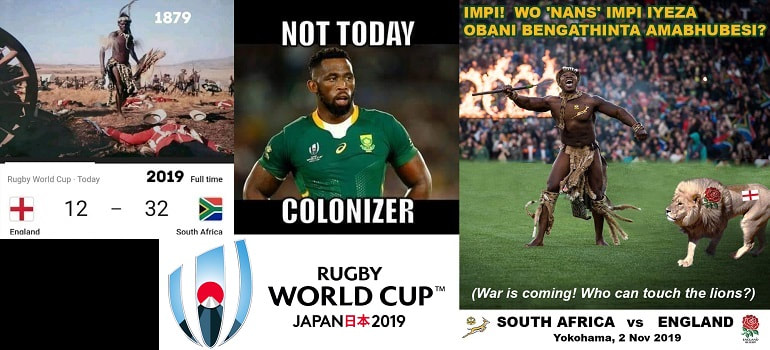|
With a young democracy, South Africa is in a state of transition, and rugby has been used as a tool before to unite a divided country. Since then, youth have questioned the breadth and depth of change. We find ourselves at this threshold again. I thought it fitting that South Africa (a former British colony) and England would be battling it out in a modern-day form of war: rugby. These two nations are not unfamiliar opponents — in sport and in actual war. Walking through the Saturday market in Franschhoek on the day of the 2019 Rugby World Cup final, it was easy to spot the tourists. They stood in stark contrast to a sea of gold and green jerseys. Dutch conversations and German accents were drowned out by South African music blaring from phones and cars hooting as they drove by with flags flailing from open windows. I found a table in a small restaurant with a TV. Behind me, an elderly couple proudly displayed their British identity and, to my left, a larger family also from England were making their presence known. Their confidence didn’t last long, as the Springboks won, and the British tourists snuck out of the restaurant, avoiding eye contact. Conversations and media headlines that followed emphasised how ‘desperately’ South Africa needed this win: to instill a sense of national pride, to create non-political cohesion, and to enforce some kind of social transformation. Lesson one: pick a side It’s easy — particularly in the media, marketing and advertising industries — to want to tell feel-good stories, especially if surrounded by chaos and catastrophe. Many brands tend to avoid risk and play it safe by avoiding stories that might alienate them among particular markets; look at the polarised responses received by Gillette recently when it made noise. Alberto Brea identifies three types of brands: passive (sticking to the way things have always been done), active (encouraging engagement and co-creation with consumers), and neutral (lacking edge and purpose as they follow a linear journey). “We must always take sides. Neutrality helps the oppressor, never the victim. Silence encourages the tormentor, never the tormented.” — Elie Wiesel, Holocaust survivor & activist. Lesson two: stand your ground Having a clearly defined brand purpose or positioning requires consistency in communication and behaviour. Knowing what we stand for, and where we want to be, helps us figure out how to get there. Whether it is providing a platform, creating opportunities, or crafting solutions, brands and businesses have the power to influence, shape, and change the course we are on. “Until the lions have their own historians, the history of the hunt will always glorify the hunter” — Chinua Achebe, novelist. Lesson three: share the glory Many brands have access to exclusive resources and a large audience. They have the opportunity — and social responsibility — to create positive, long-term transformation. Just as the Springboks returned home and toured the country to share their victory and to recognise the role we all played, so too could brands and businesses distribute the glory. “What we do is more important than what we say or what we say we believe.” — bell hooks, activist. This article was published on Marklives
0 Comments
Leave a Reply. |
MARGUERITE COETZEE
ANTHROPOLOGIST | ARTIST | FUTURIST CATEGORIES
All
|

 RSS Feed
RSS Feed
